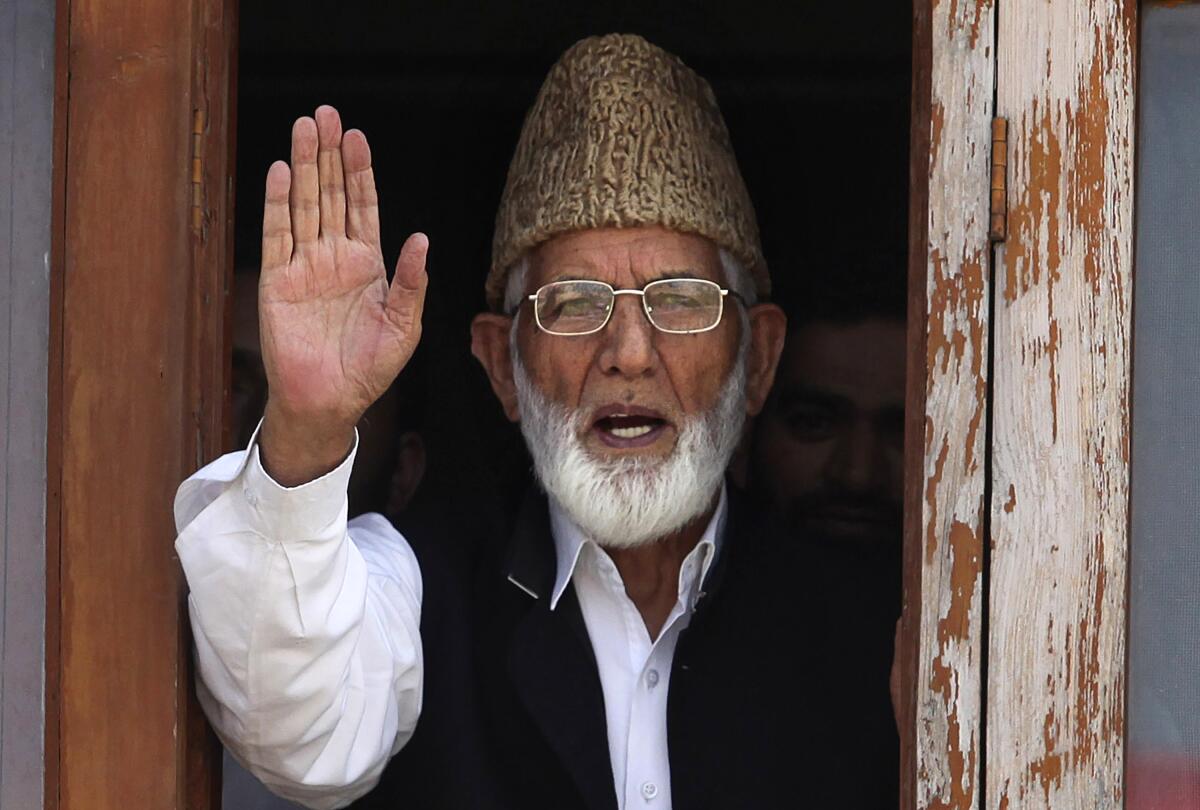Family of late Kashmir leader charged under India anti-terror law

- Share via
SRINAGAR, India — Police in Indian-controlled Kashmir charged family members of late resistance leader Syed Ali Geelani under a harsh anti-terror law for raising anti-India slogans and wrapping his body in the Pakistani flag, officials said Sunday.
Geelani, who died Wednesday at age 91, was the emblem of Kashmir’s defiance against New Delhi and had been under house arrest for years.
His son, Naseem, said Indian authorities buried Geelani’s body in a local cemetery without any family members present after police snatched his body from the home. Police denied that and called it “baseless rumors” by “some vested interests.”
A video widely shared on social media purportedly showed Geelani’s relatives, mostly women, frantically trying to prevent armed police from forcing their way into the room where his body, wrapped in a Pakistani flag, was being kept. It showed women wailing and screaming as police took the body and locked his family and relatives inside the room.
Police said unspecified family members and some others were charged Saturday under the Unlawful Activities (Prevention) Act. They have not yet been taken into custody.
The anti-terror law was amended in 2019 to allow the government to designate an individual as a terrorist. Police can detain a person for six months without producing any evidence, and the accused can subsequently be imprisoned for up to seven years. Rights activists have called the law draconian.
Geelani’s son Naseem said Sunday that a police officer visited the family Saturday and informed them a case had been registered. Naseem did not provide further details about the meeting, but said there were scuffles as the police removed his father’s body.
“Amid the chaos, we didn’t really know what was happening. We were mourning,” Naseem said.
Kashmir has long been a flashpoint between India and Pakistan, which administer parts of the Himalayan region while claiming it entirely.
Geelani spearheaded Kashmir’s movement for the right to self-determination and was a staunch proponent of merging Kashmir with Pakistan. For many in Kashmir and beyond, he was an enduring icon of defiance against India.
India describes the armed rebellion as Islamabad’s proxy war and state-sponsored terrorism. Most Muslim Kashmiris consider it a legitimate freedom struggle and support the rebel goal that the territory be united, either under Pakistani rule or as an independent country.
Pakistan’s Prime Minister Imran Khan slammed India’s removal and hasty burial of Geelani’s body as well as the case against the family, calling it “shameful” in a tweet Sunday.
Rebels have been fighting against Indian rule since 1989. The region is one of the most heavily militarized in the world. Tens of thousands of civilians, rebels and government forces have been killed in the raging conflict.
Tensions flared in the region in 2019 after New Delhi stripped Kashmir’s semi-autonomy, scrapped its statehood and removed inherited protections on land and jobs. Authorities have since brought a slew of new laws, which critics and many Kashmiris fear could change the region’s demographics.
Meanwhile Sunday, authorities eased some restrictions that had been imposed since Geelani’s death, allowing private vehicles on roads and vendors to operate in some parts of Srinagar. However, most shops and businesses stayed closed as government forces patrolled roads and streets in the city.
Mobile phones were restored late Friday, but mobile internet and restrictions on the assembly of people continued in many parts of the Kashmir Valley.
Paramilitary soldiers remained stationed outside the graveyard where Geelani was buried.
Ruwa Shah, Geelani’s granddaughter, wrote on Twitter they were horrified by “what followed after our old man passed away.” His “home was a jail for over a decade and now his graveyard is a jail too,” she said.
More to Read
Sign up for Essential California
The most important California stories and recommendations in your inbox every morning.
You may occasionally receive promotional content from the Los Angeles Times.









